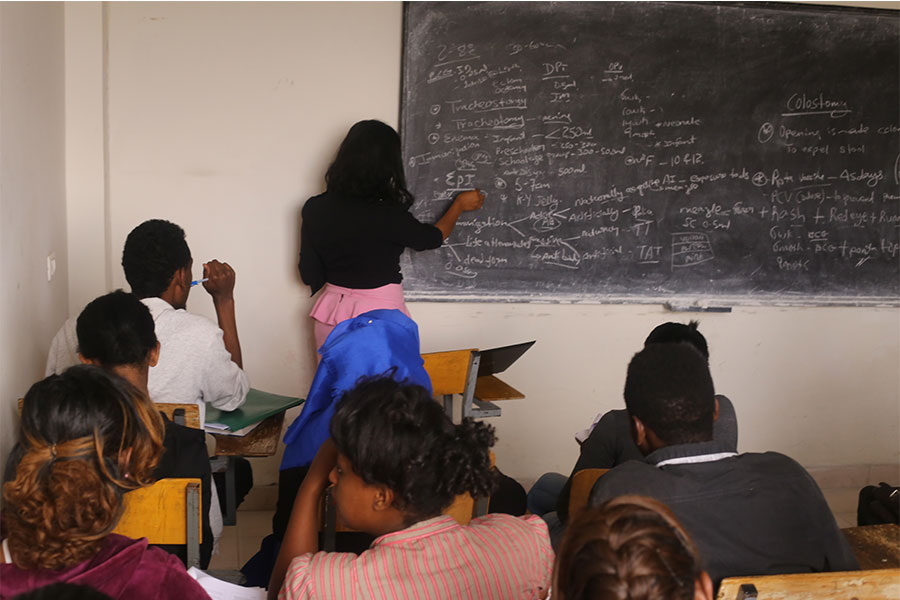
Fortune News | Apr 10,2021
May 11 , 2019
By
It was astonishing to many that there are private universities in Ethiopia trying to skim off the top and ignore rules and regulations, putting the future of their students in dire jeopardy. A recent audit carried out by the Higher Education Relevance & Quality Agency (HERQA) uncovered that 46 institutions were operating with major violations of educational standards, accreditation requirements and other irregularities in and around Addis Abeba.
Some were calling themselves “university-colleges” when they were officially designated as colleges. Others were graduating students in majors, of which they had not obtained accreditation from the Agency. This is, indeed, a major breach of the public’s confidence and trust, for which the colleges should be heavily punished. These schools have plunged the future of their students into uncertain territory.
What is stunning is that the scale of the betrayal by these for-profit higher learning institutions was greeted by surprise, which is an indication of the misguided views we hold of the education sector.
For-profit higher education institutions generally lack good reputations in the public eye. Established universities such as Harvard are private and are administered through a fund that reinvests any earnings gained from its investments back into the institution.
This is not the case with for-profit colleges. Their primary goal is to make money. It is not to ensure that students get the best education possible and quality standards are not sacrificed.
“If you’re considering schooling after high school, either as a teenage freshman or as an adult, do yourself a big favor and do not, under any circumstances, enroll at a for-profit college,” wrote Derek Newton, vice-president at The Century Foundation, a public policy think tank with an emphasis on education, for Forbes. His article was headlined, “20,000 More Reasons To Never Go To a For-Profit School,” referring to a private college that recently went under in the US, “leaving nearly 20,000 students in a big lurch.”
Not all private universities are failures, but the overwhelming majority are. A good for-profit college is an exception, not the rule.
In the United States, 96pc of all higher learning institutions that went bankrupt by 2013 were for-profit colleges. In terms of sustainability, affordability and student credentials that have values, our private colleges are doing a better job.
It is this information gap that led to the surprise when for-profit colleges failed in the upkeep of their mandates. Of course, profits stand in the way of delivering quality education, and inevitably profits often win. HERQA can perhaps address irregularities in these colleges. But it will never by itself be able to fix the broken educational system, which is the ultimate reason behind the proliferation of for-profit higher education institutions – schools that are pre-disposed to violate rules and regulations and fail to deliver on their promises.
We should not look for problems any further than in our own educational system, where government interference plays a negative impact on education. The government establishes quotas for student majors, it builds public universities far from urban centres, and the state determines what field of studies students pursue and what universities they go to after high school graduation. These university placements are made solely on the basis of national matriculation exams that high school students take upon graduation. No consideration is made of the students’ interests, skills or any enriching extracurricular activities that they bring with them.
Our education system tries to create the illusion of an educated populace, instead of the real thing. Without giving public universities more autonomy and flexibility, especially on how they admit students and without removing political agendas from the education system, it is hard to imagine how the state university system can be reformed. It is this failure of the government policy that is opening up space for for-profit colleges to proliferate.
HERQA is not the only one to blame in this broken system, the entire system is at fault and has failed our students. If the situation remains unaddressed by the government, Ethiopian students will continue to face the same problems far into the future.
PUBLISHED ON
May 11,2019 [ VOL
20 , NO
993]

Fortune News | Apr 10,2021

Fortune News | May 25,2019

Commentaries | Oct 31,2020

View From Arada | Feb 22,2020

News Analysis | Aug 07,2021

View From Arada | Aug 28,2021

Verbatim | Oct 27,2024

Commentaries | Feb 03,2024

Verbatim | Aug 28,2021

My Opinion | Mar 07,2020

My Opinion | 131548 Views | Aug 14,2021

My Opinion | 127903 Views | Aug 21,2021

My Opinion | 125879 Views | Sep 10,2021

My Opinion | 123510 Views | Aug 07,2021

Dec 22 , 2024 . By TIZITA SHEWAFERAW
Charged with transforming colossal state-owned enterprises into modern and competitiv...

Aug 18 , 2024 . By AKSAH ITALO
Although predictable Yonas Zerihun's job in the ride-hailing service is not immune to...

Jul 28 , 2024 . By TIZITA SHEWAFERAW
Unhabitual, perhaps too many, Samuel Gebreyohannes, 38, used to occasionally enjoy a couple of beers at breakfast. However, he recently swit...

Jul 13 , 2024 . By AKSAH ITALO
Investors who rely on tractors, trucks, and field vehicles for commuting, transporting commodities, and f...

Jun 28 , 2025
Meseret Damtie, the assertive auditor general, has never been shy about naming names...

Jun 21 , 2025
A well-worn adage says, “Budget is not destiny, but it is direction.” Examining t...

Jun 14 , 2025
Yet again, the Horn of Africa is bracing for trouble. A region already frayed by wars...

Jun 7 , 2025
Few promises shine brighter in Addis Abeba than the pledge of a roof for every family...

Jun 29 , 2025
Addis Abeba's first rains have coincided with a sweeping rise in private school tuition, prompting the city's education...

Jun 29 , 2025 . By BEZAWIT HULUAGER
Central Bank Governor Mamo Mihretu claimed a bold reconfiguration of monetary policy...

Jun 29 , 2025 . By BEZAWIT HULUAGER
The federal government is betting on a sweeping overhaul of the driver licensing regi...

Jun 29 , 2025 . By NAHOM AYELE
Gadaa Bank has listed 1.2 million shares on the Ethiopian Securities Exchange (ESX),...